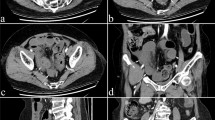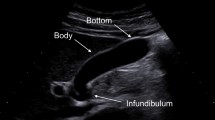Abstract
Mesenteric abnormalities are often incidentally discovered on cross-sectional imaging performed during daily clinical practice. Findings can range from the vague “misty mesentery” to solid masses, and the possible etiologic causes encompass a wide spectrum of underlying pathologies including infectious, inflammatory, and neoplastic processes. Unfortunately, the clinical and imaging findings are often non-specific and may overlap. This article discusses the various diseases that result in mesenteric abnormalities. It provides a framework to non-invasively differentiate these entities, when possible.
















Similar content being viewed by others
References
Jeon YS, Lee JW, Cho SG (2009) Is it from the mesentery or the omentum? MDCT features of various pathologic conditions in intraperitoneal fat planes. Surg Radiol Anat 31(1):3–11
Seo BK, Ha HK, Kim AY, et al. (2003) Segmental misty mesentery: analysis of CT features and primary causes. Radiology 226(1):86–94
Mindelzun RE, Jeffrey RB, Lane MJ, Silverman PM (1996) The misty mesentery on CT: differential diagnosis. AJR Am J Roentgenol 167(1):61–65
Filippone A, Cianci R, Di Fabio F, Storto ML (2011) Misty mesentery: a pictorial review of multidetector-row CT findings. Radiol Med 116(3):351–365
Levy AD, Rimola J, Mehrotra AK, Sobin LH (2006) From the archives of the AFIP: benign fibrous tumors and tumor like lesions of the mesentery: radiologic-pathologic correlation. Radiographics 26(1):245–264
White B, Kong A, Chang A-L (2005) Sclerosing mesenteritis. Australas Radiol 49(2):185–188
Vlachos K, Archontovasilis F, Falidas E, et al. (2011) Sclerosing mesenteritis: diverse clinical presentations and dissimilar treatment options. A case series and review of the literature. Int Arch Med 4:17
Friedman LS (2013) In: Lamont JT (ed) Sclerosing mesenteritis. pp 1–12.
Daskalogiannaki M, Voloudaki A, Prassopoulos P, et al. (2000) CT evaluation of mesenteric panniculitis: prevalence and associated diseases. Am J Roentgenol 174(2):427–431
Canyigit M, Koksal A, Akgoz A, et al. (2011) Multidetector-row computed tomography findings of sclerosing mesenteritis with associated diseases and its prevalence. Jpn J Radiol 29(7):495–502
Gögebakan Ö, Albrecht T, Osterhoff MA, Reimann A (2013) Is mesenteric panniculitis truly a paraneoplastic phenomenon? A matched pair analysis. Eur J Radiol 82(11):1853–1859
Sabaté JM, Torrubia S, Maideu J, et al. (1999) Sclerosing mesenteritis: imaging findings in 17 patients. Am J Roentgenol 172(3):625–629
Akram S, Pardi DS, Schaffner JA, Smyrk TC (2007) Sclerosing mesenteritis: clinical features, treatment, and outcome in ninety-two patients. Clin Gastroenterol Hepatol 5(5):589–596
Horton KM, Lawler LP, Fishman EK (2003) CT findings in sclerosing mesenteritis (panniculitis): spectrum of disease. Radiographics 23(6):1561–1567
Smith ZL, Sifuentes H, Deepak P, Ecanow DB, Ehrenpreis ED (2013) Relationship between mesenteric abnormalities on computed tomography and malignancy: clinical findings and outcomes of 359 patients. J Clin Gastroenterol 47(5):409–414
Wilkes A, Griffin N, Dixon L, Dobbs B, Frizelle FA (2012) Mesenteric panniculitis: a paraneoplastic phenomenon? Dis Colon Rectum 55(7):806–809
Kipfer RE, Moertel CG, Dahlin DC (1974) Mesenteric lipodystrophy. Ann Intern Med 80(5):582–588
Emory TS, Monihan JM, Carr NJ, Sobin LH (1997) Sclerosing mesenteritis, mesenteric panniculitis and mesenteric lipodystrophy: a single entity? Am J Surg Pathol 21(4):392–398
Katz ME, Heiken JP, Glazer HS, Lee JK (1985) Intraabdominal panniculitis: clinical, radiographic, and CT features. Am J Roentgenol 145(2):293–296
Corwin MT, Smith AJ, Karam AR, Sheiman RG (2012) Incidentally detected misty mesentery on CT: risk of malignancy correlates with mesenteric lymph node size. J Comput Assist Tomogr 36(1):26–29
Sheth S, Horton KM, Garland MR, Fishman EK (2003) Mesenteric neoplasms: CT appearances of primary and secondary tumors and differential diagnosis. Radiographics 23(2):457–473
Le O (2013) Patterns of peritoneal spread of tumor in the abdomen and pelvis. World J Radiol 5(3):106–112
Okino Y, Kiyosue H, Mori H, et al. (2001) Root of the small-bowel mesentery: correlative anatomy and CT features of pathologic conditions. Radiographics 21(6):1475–1490
Lucey BC, Stuhlfaut JW, Soto JA (2005) Mesenteric lymph nodes seen at imaging: causes and significance. Radiographics 25(2):351–365
Hamrick-Turner JE, Chiechi MV, Abbitt PL, Ros PR (1992) Neoplastic and inflammatory processes of the peritoneum, omentum, and mesentery: diagnosis with CT. Radiographics 12(6):1051–1068
Yenarkarn P, Thoeni RF, Hanks D (2007) Case 107: lymphoma of the mesentery. Radiology 242(2):628–631
Anis M, Irshad A (2008) Imaging of abdominal lymphoma. Radiol Clin North Am 46(2):265–285, viii–ix
Hardy SM (2003) The sandwich sign. Radiology 226(3):651–652
Valls CC (2000) Fat-ring sign in sclerosing mesenteritis. Am J Roentgenol 174(1):259–260
Coulier BB (2011) Mesenteric panniculitis. Part 1: MDCT—pictorial review. JBR-BTR 94(5):229–240
Nakatani K, Nakamoto Y, Togashi K (2013) FDG-PET/CT assessment of misty mesentery: feasibility for distinguishing viable mesenteric malignancy from stable conditions. Eur J Radiol 82(8):e380–e385
Strosberg J (2012) Neuroendocrine tumours of the small intestine. Best Pract Res Clin Gastroenterol 26(6):755–773
Yao JCJ, Hassan MM, Phan AA, et al. (2008) One hundred years after “carcinoid”: epidemiology of and prognostic factors for neuroendocrine tumors in 35,825 cases in the United States. J Clin Oncol 26(18):3063–3072
Levy AD, Sobin LH (2007) From the archives of the AFIP: Gastrointestinal carcinoids: imaging features with clinicopathologic comparison. Radiographics 27(1):237–257
Ganeshan D, Bhosale P, Yang T, Kundra V (2013) Imaging features of carcinoid tumors of the gastrointestinal tract. Am J Roentgenol 201(4):773–786
Horton KM, Kamel I, Hofmann L, Fishman EK (2004) Carcinoid tumors of the small bowel: a multitechnique imaging approach. Am J Roentgenol 182(3):559–567
Pantongrag-Brown L, Buetow PC, Carr NJ, Lichtenstein JE, Buck JL (1995) Calcification and fibrosis in mesenteric carcinoid tumor: CT findings and pathologic correlation. Am J Roentgenol 164(2):387–391
Scarsbrook AF, Ganeshan A, Statham J, et al. (2007) Anatomic and functional imaging of metastatic carcinoid tumors. Radiographics 27(2):455–477
Castellazzi G, Vanel D, Le Cesne A, et al. (2009) Can the MRI signal of aggressive fibromatosis be used to predict its behavior? Eur J Radiol 69(2):222–229
Devata S, Chugh R (2013) Desmoid tumors: a comprehensive review of the evolving biology, unpredictable behavior, and myriad of management options. Hematol/Oncol Clin North Am 27(5):989–1005
Burke AP, Sobin LH, Shekitka KM, Federspiel BH, Helwig EB (1990) Intra-abdominal fibromatosis. A pathologic analysis of 130 tumors with comparison of clinical subgroups. Am J Surg Pathol 14(4):335–341
George V, Tammisetti VS, Surabhi VR, Shanbhogue AK (2013) Chronic fibrosing conditions in abdominal imaging. Radiographics 33(4):1053–1080
Einstein DM, Tagliabue JR, Desai RK (1991) Abdominal desmoids: CT findings in 25 patients. Am J Roentgenol 157(2):275–279
Kawashima A, Goldman SM, Fishman EK, et al. (1994) CT of intraabdominal desmoid tumors: is the tumor different in patients with Gardner’s disease? Am J Roentgenol 162(2):339–342
Faria SC, Iyer RB, Rashid A, Ellis L, Whitman GJ (2004) Desmoid tumor of the small bowel and the mesentery. Am J Roentgenol 183(1):118
Casillas J, Sais GJ, Greve JL, Iparraguirre MC, Morillo G (1991) Imaging of intra- and extraabdominal desmoid tumors. Radiographics 11(6):959–968
Azizi L, Balu M, Belkacem A, et al. (2005) MRI features of mesenteric desmoid tumors in familial adenomatous polyposis. Am J Roentgenol 184(4):1128–1135
Healy JC, Reznek RH, Clark SK, Phillips RK, Armstrong P (1997) MR appearances of desmoid tumors in familial adenomatous polyposis. Am J Roentgenol 169(2):465–472
Levy AD, Arnaiz J, Shaw JC, Sobin LH (2008) From the archives of the AFIP: primary peritoneal tumors: imaging features with pathologic correlation. Radiographics 28(2):583–607
Jeong YJ, Kim S, Kwak SW, et al. (2008) Neoplastic and nonneoplastic conditions of serosal membrane origin: CT findings. Radiographics 28(3):801–818
Dong P (2008) Tuberculosis versus non-Hodgkin’s lymphomas involving small bowel mesentery: Evaluation with contrast-enhanced computed tomography. World J Gastroenterol 14(24):3914
Gordon K, Lee WK, Hennessy O (2005) Computed tomography manifestations of peritoneal diseases. Australas Radiol 49(4):269–277
Pereira JM, Madureira AJ, Vieira A, Ramos I (2005) Abdominal tuberculosis: imaging features. Eur J Radiol 55(2):173–180
Wat SYJ, Harish S, Winterbottom A, Choudhary AK, Freeman AH (2006) The CT appearances of sclerosing mesenteritis and associated diseases. Clin Radiol 61(8):652–658
Akhan O, Pringot J (2002) Imaging of abdominal tuberculosis. Eur Radiol 12(2):312–323
McLaughlin PD, Maher MM (2013) Nonneoplastic diseases of the small intestine: differential diagnosis and crohn disease. Am J Roentgenol 201(2):W174–W182
McLaughlin PD, Filippone A, Maher MM (2013) The “misty mesentery”: mesenteric panniculitis and its mimics. Am J Roentgenol 200(2):W116–W123
Breda Vriesman AC, Schuttevaer HM, Coerkamp EG, Puylaert JBCM (2004) Mesenteric panniculitis: US and CT features. Eur Radiol 14(12):2242–2248
Meyers MA (2006) Dynamic radiology of the abdomen. New York: Springer
Coulier B, Maldague P, Bourgeois A, Broze B (2007) Diverticulitis of the small bowel: CT diagnosis. Abdom Imaging 32(2):228–233
Ojili V, Parizi M, Gunabushanam G (2013) Timely diagnosis of perforated jejunal diverticulitis by computed tomography. J Emerg Med 44(3):614–616
Hines J, Rosenblat J, Duncan DR, Friedman B, Katz DS (2013) Perforation of the mesenteric small bowel: etiologies and CT findings. Emerg Radiol 20(2):155–161
Author information
Authors and Affiliations
Corresponding author
Rights and permissions
About this article
Cite this article
Taffel, M.T., Khati, N.J., Hai, N. et al. De-Misty-fying the mesentery: an algorithmic approach to neoplastic and non-neoplastic mesenteric abnormalities. Abdom Imaging 39, 892–907 (2014). https://doi.org/10.1007/s00261-014-0113-1
Published:
Issue Date:
DOI: https://doi.org/10.1007/s00261-014-0113-1




